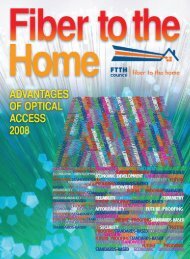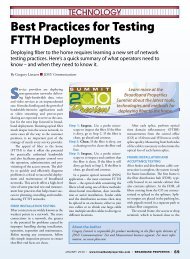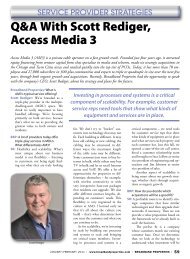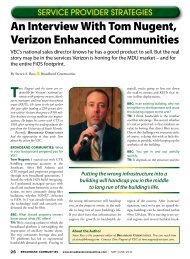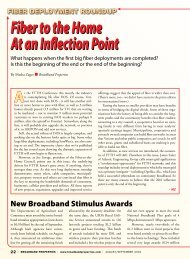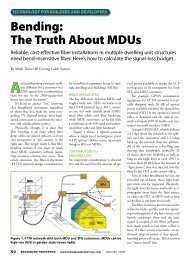2010 Buyers Guide - Broadband Properties
2010 Buyers Guide - Broadband Properties
2010 Buyers Guide - Broadband Properties
You also want an ePaper? Increase the reach of your titles
YUMPU automatically turns print PDFs into web optimized ePapers that Google loves.
In a Remote County, FTTH Is<br />
A Lifeline to the World<br />
For Cook County, Minn., fiber to the home represents the best hope for<br />
keeping isolated communities viable.<br />
By Masha Zager ■ <strong>Broadband</strong> <strong>Properties</strong><br />
If there were a prize for the most remote<br />
area in the United States, Cook<br />
County would be in the running.<br />
About 5,000 people, or four per square<br />
mile, live in this northeastern corner of<br />
Minnesota, with Ontario to the north<br />
and Lake Superior to the east. There is<br />
only one town – the county seat, Grand<br />
Marais – and only one industry, tourism.<br />
Half the county is under water, ninetenths<br />
of the dry land is owned by the<br />
federal or state government and winter<br />
temperatures routinely drop to 30 below<br />
zero. The closest city of any size, Duluth,<br />
is more than 100 miles away.<br />
The Internet was slow to reach Cook<br />
County. Until 1995, when community<br />
members founded a cooperative ISP, not<br />
even dial-up service was available. Today,<br />
except for small pockets of wireless<br />
and DSL access, most of the county still<br />
has no broadband, and the condition of<br />
the telephone network is so poor that<br />
dial-up speeds are often limited to 10 to<br />
20 Kbps. The Minnesota Ultra High-<br />
Speed <strong>Broadband</strong> Task Force called<br />
Cook County the most underserved<br />
county in the state.<br />
No <strong>Broadband</strong>, No Visitors<br />
Despite the cold and the remote location,<br />
Cook County residents were able<br />
to eke out good livings, because the<br />
county’s spectacular scenery and its<br />
recreational opportunities – kayaking,<br />
climbing, hiking and more – drew summer<br />
visitors. But as the world became<br />
more connected, the costs of isolation<br />
grew steeper and the county’s economic<br />
future began to look bleak.<br />
According to county IT director<br />
Danna MacKenzie, hotels, inns and<br />
Without broadband, the residents of Cook<br />
County are becoming increasingly isolated.<br />
lodges report that guests are no longer<br />
willing to stay in places without broadband,<br />
and that college students will not<br />
take summer jobs if it means losing touch<br />
with the world. The owners of these accommodations<br />
cannot participate in online<br />
booking systems, offer video tours,<br />
order goods online or do their banking<br />
online. As commerce moves to the Web,<br />
they are increasingly shut out.<br />
Second-home buyers, too, hesitate to<br />
buy in the area. Local realtors say many<br />
sales have fallen through when potential<br />
buyers learned they could not obtain<br />
broadband. For example, a pair of Mayo<br />
Clinic doctors looking for a summer<br />
home showed interest in a Cook County<br />
house until they realized they could<br />
never work remotely.<br />
Cook County natives who have<br />
moved to the Twin Cities often inquire<br />
about returning to the place where they<br />
grew up, now that their employers – insurance<br />
companies or other large corporations<br />
– have seen the benefits of telecommuting<br />
and are willing to let them<br />
work from anywhere. “I get calls about<br />
that frequently,” MacKenzie says. “It’s increasingly<br />
common in the last two years.”<br />
She has to tell them they can’t do it.<br />
No <strong>Broadband</strong>, No Services<br />
The residents of Cook County are becoming<br />
more isolated while the rest of<br />
the country becomes more connected.<br />
In-person services that they once took<br />
for granted are disappearing. The state<br />
government is consolidating health care<br />
services to save costs, which means that<br />
residents (and visitors) will have to drive<br />
more than 100 miles each way for anything<br />
more than a routine medical appointment.<br />
The state is also centralizing<br />
the courts, making access to the legal<br />
system more difficult for residents.<br />
The antiquated telephone network is<br />
cutting people off from the world and<br />
making life more difficult and dangerous.<br />
Local businesses lost 21 days of<br />
telephone service last spring, MacKenzie<br />
says – three weeks when they couldn’t accept<br />
reservations, issue permits, or even<br />
call 911. During a recent forest fire, the<br />
Forest Service could not secure enough<br />
bandwidth for emergency cell phone<br />
coverage for first responders. The local<br />
clinic has trouble communicating medical<br />
records to its satellite offices and had<br />
to locate its H1N1 flu vaccination clinic<br />
in one of the few broadband-enabled<br />
About the Author<br />
Masha Zager is the editor of <strong>Broadband</strong> <strong>Properties</strong>. You can reach her at masha@<br />
broadbandproperties.com.<br />
62 | BROADBAND PROPERTIES | www.broadbandproperties.com | November/December 2009



